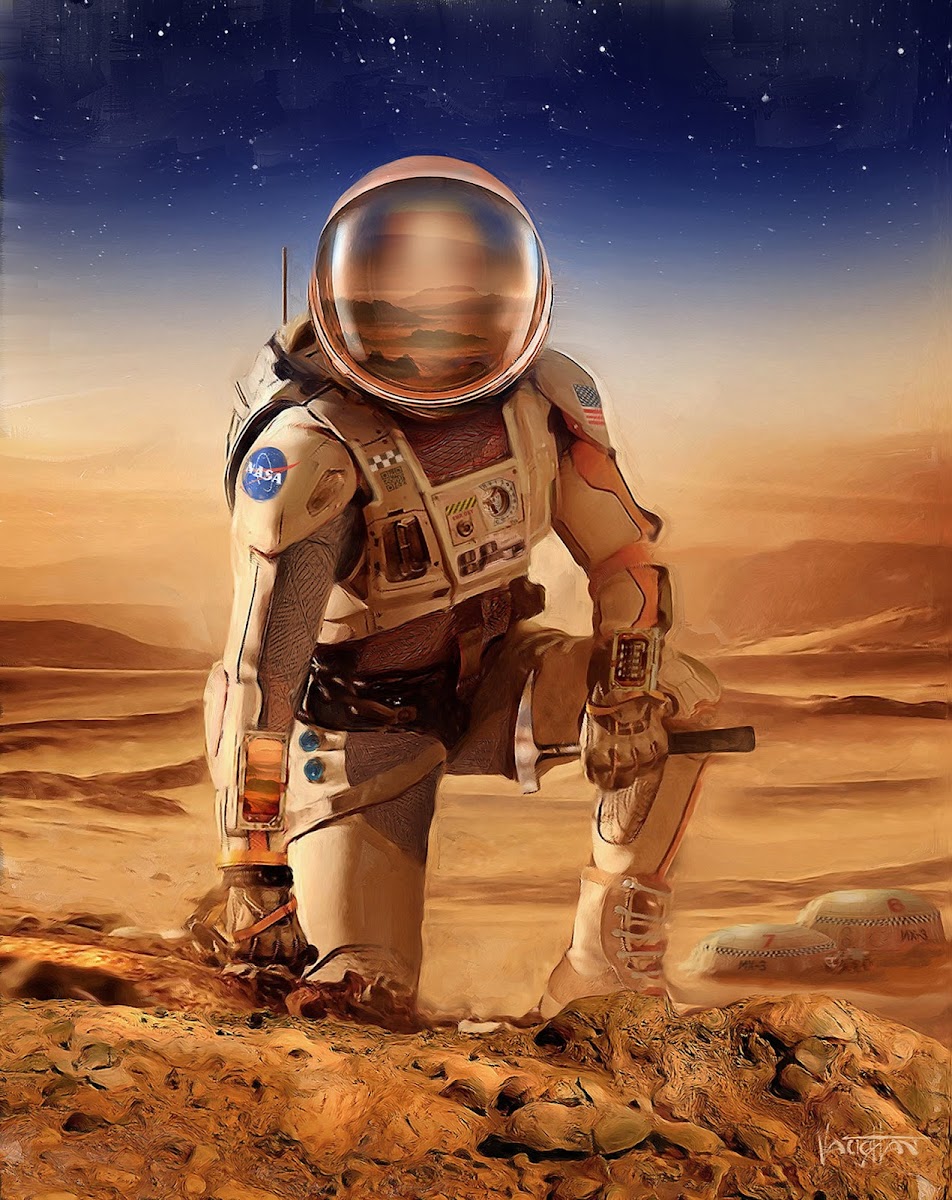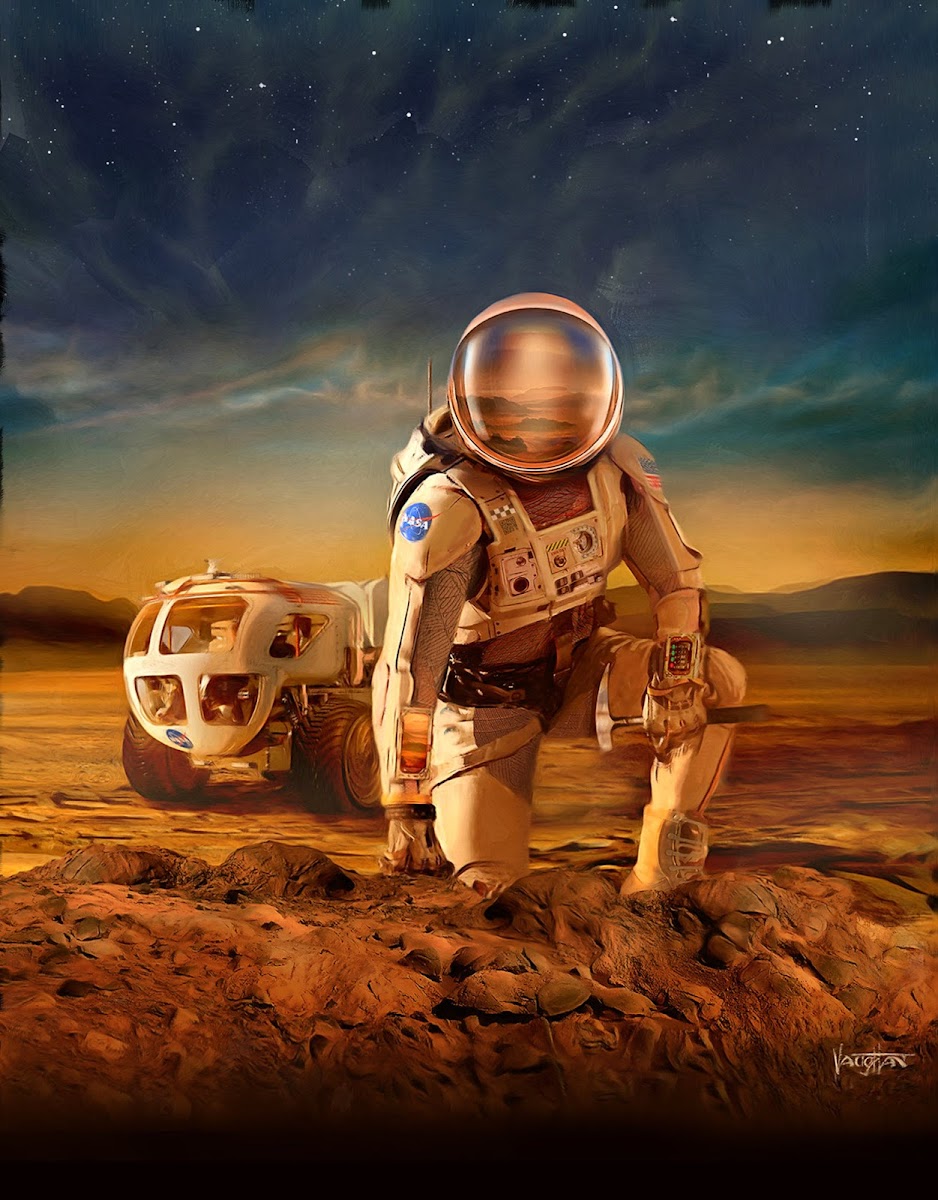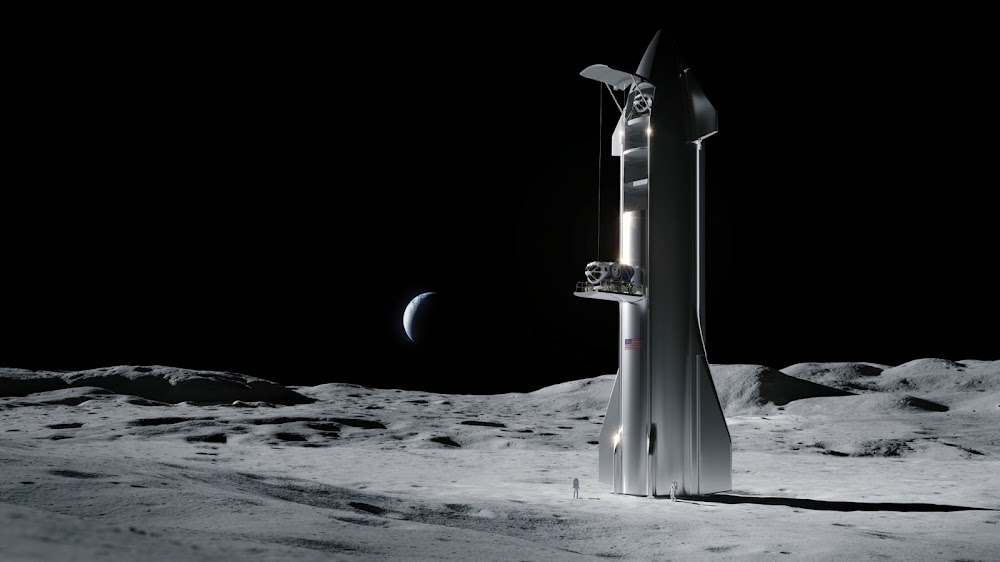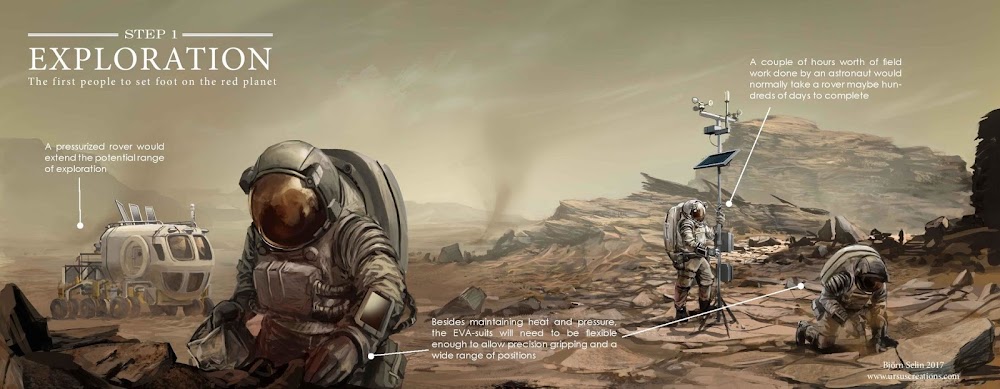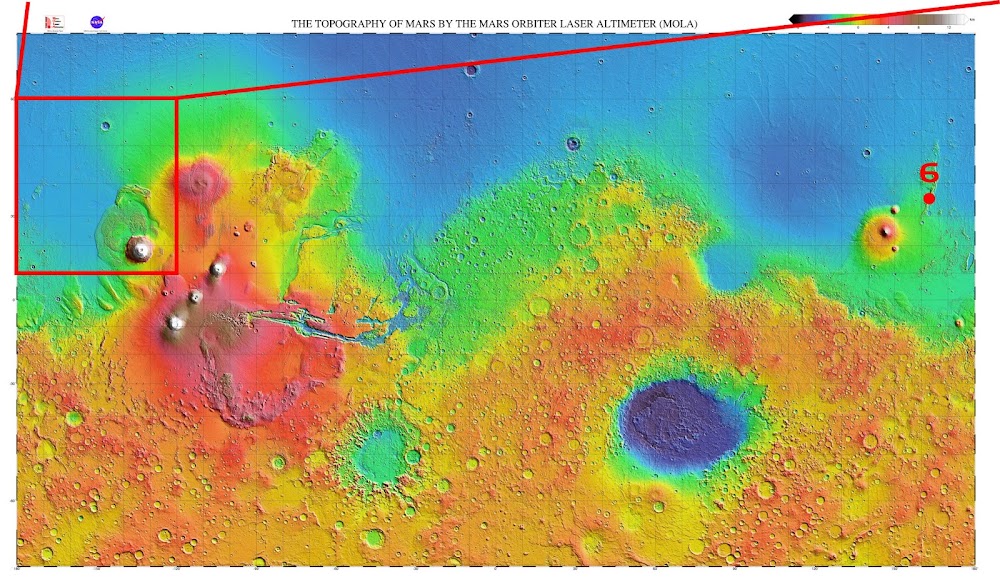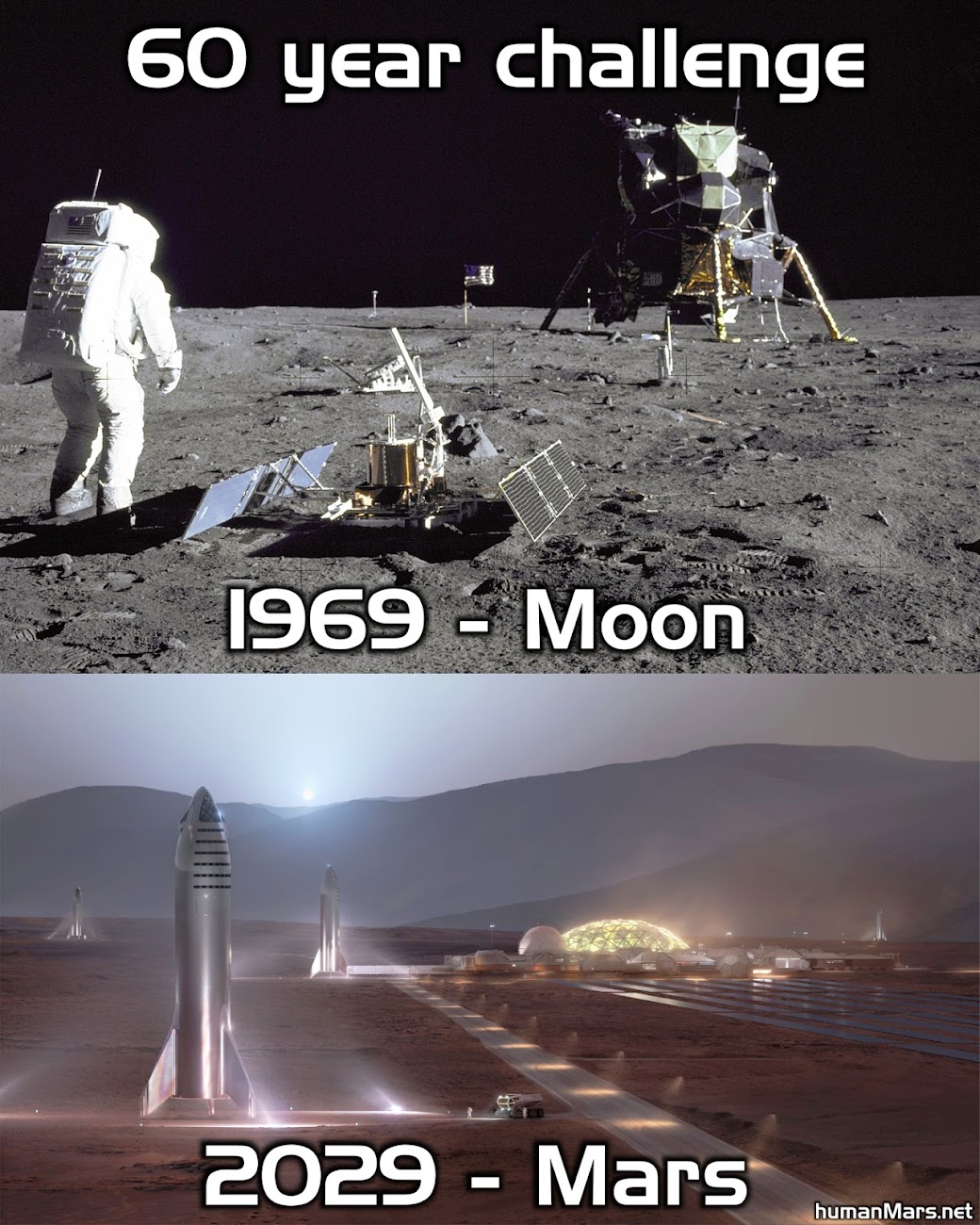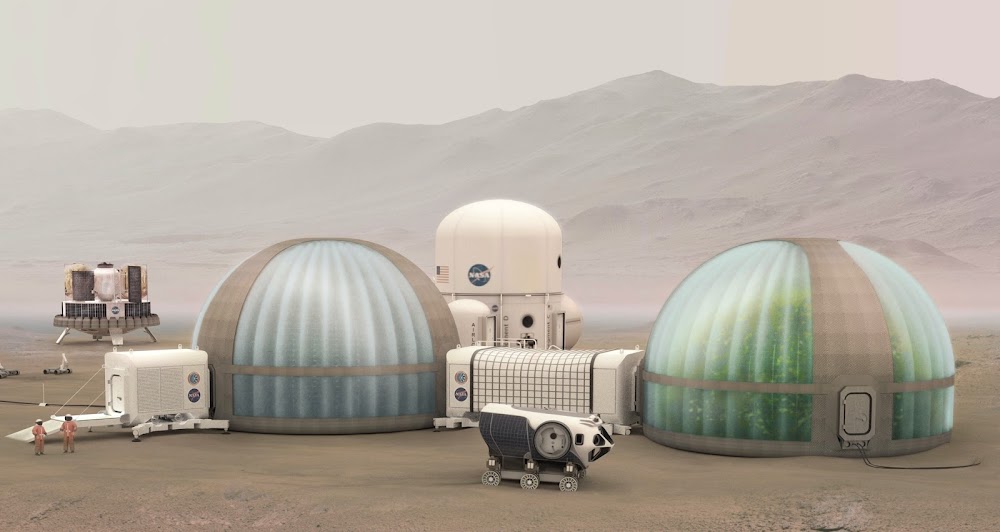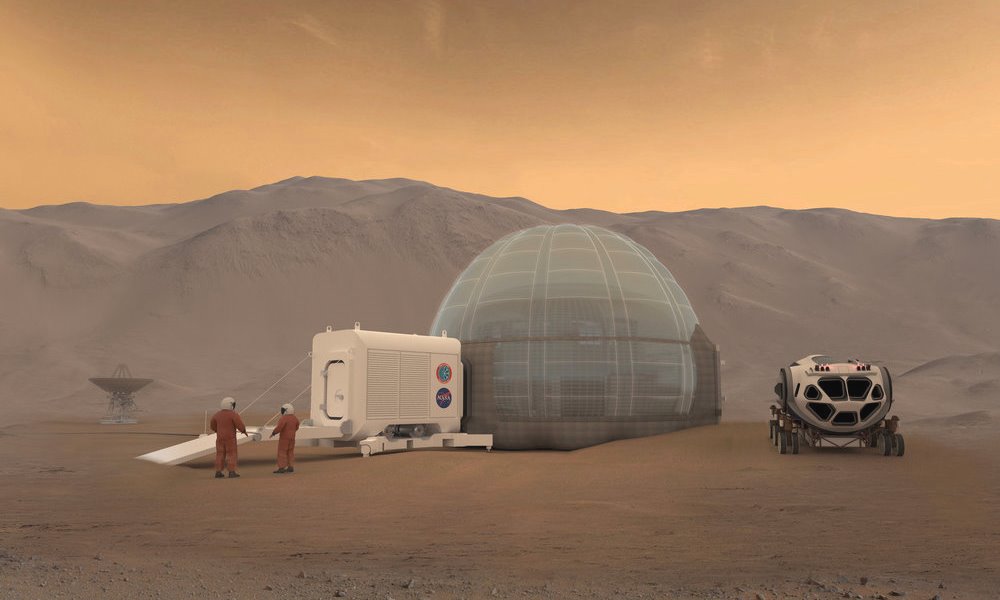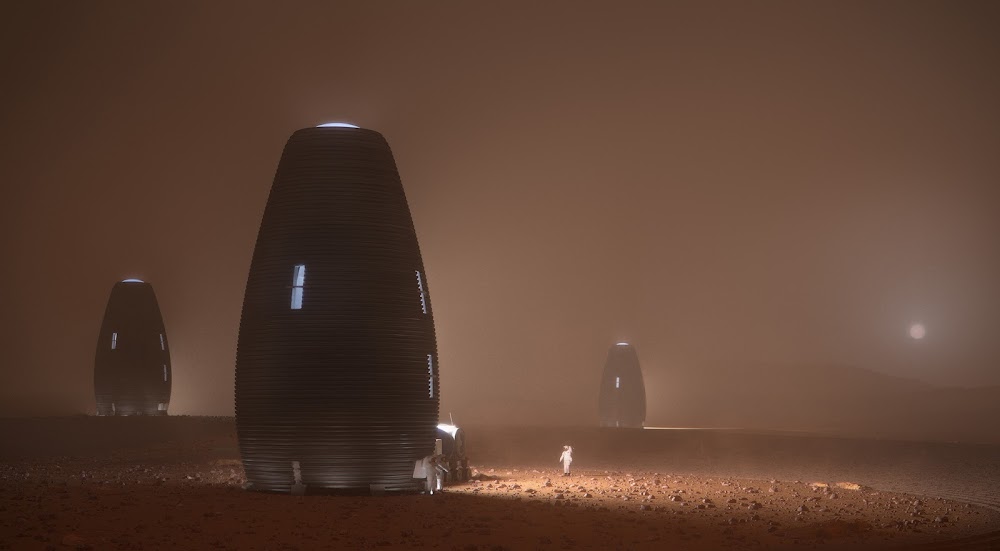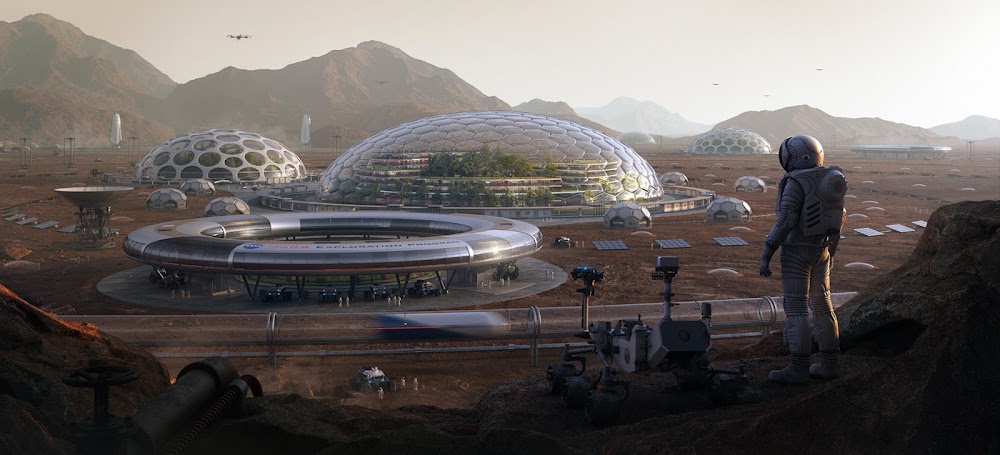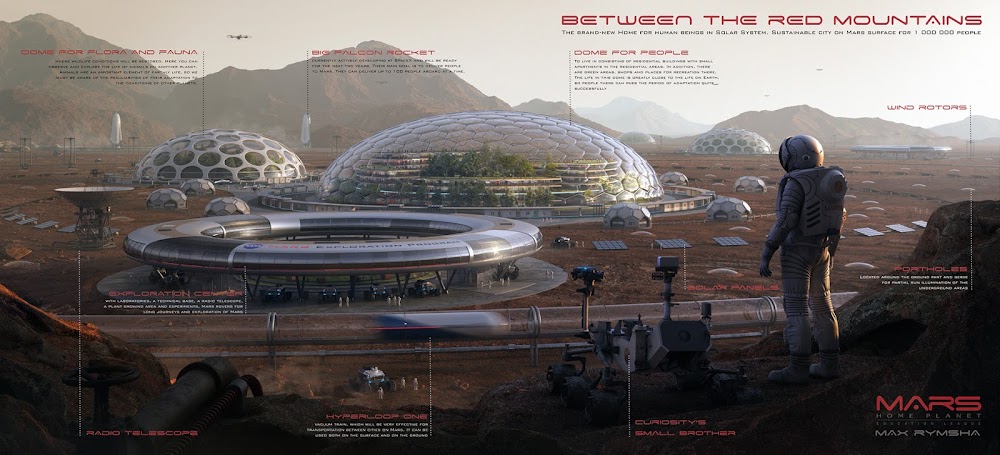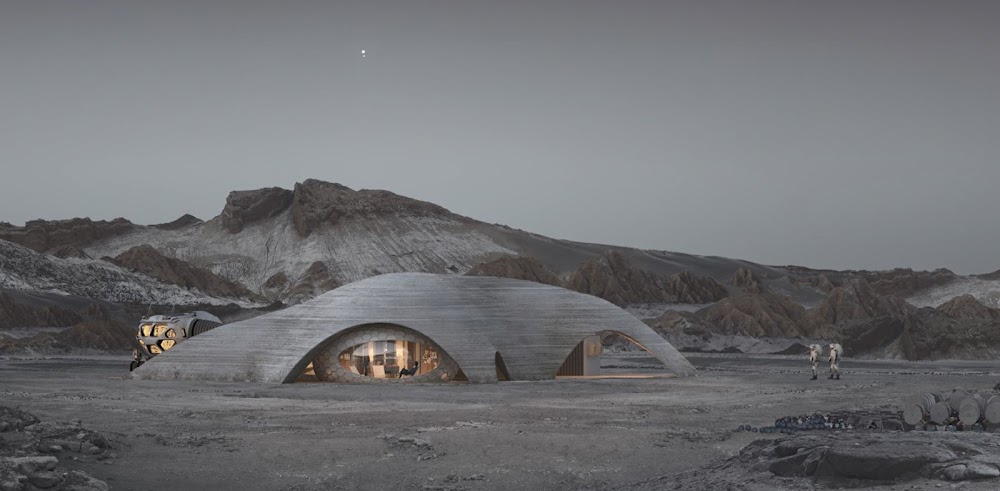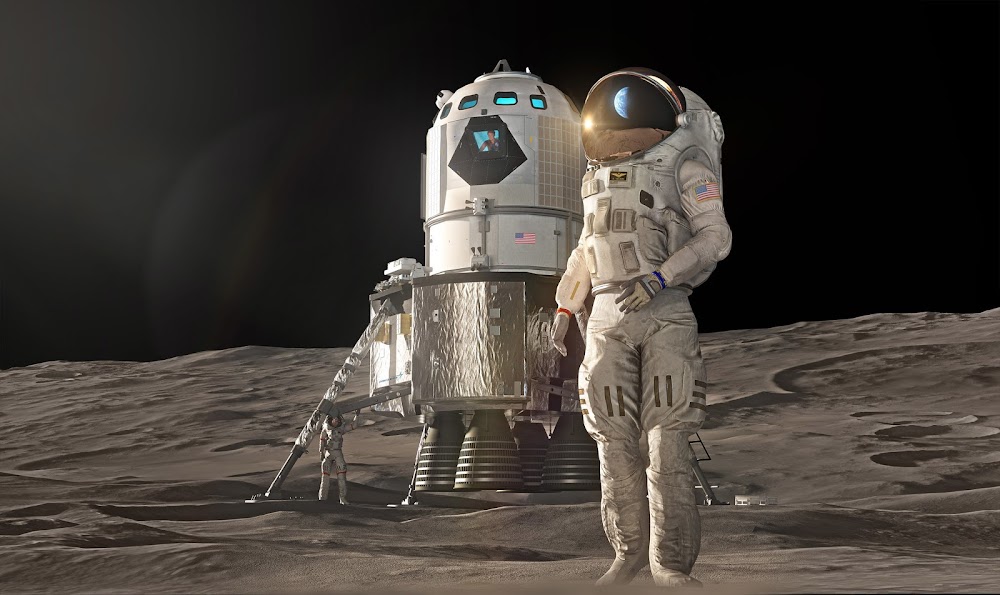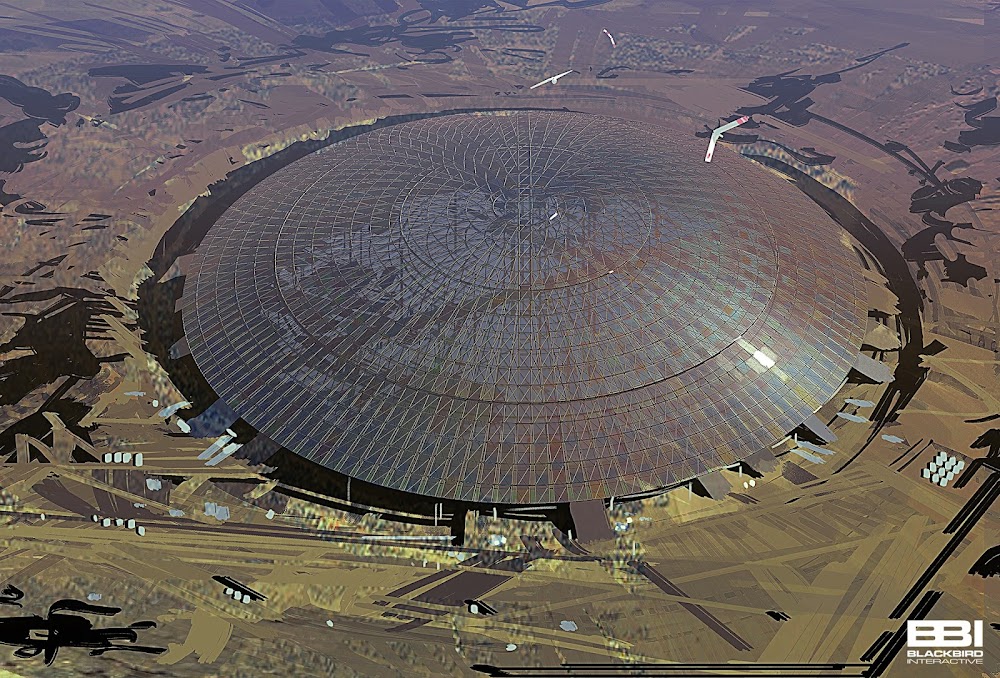Two variants of a scene with NASA's astronaut on Mars by photographer and concept artist James Vaughan - one with a small human base in the background and the second in front of an exploration rover. More of Vaughan's aerospace and defense concept art here.
Showing posts with label NASA. Show all posts
Showing posts with label NASA. Show all posts
Tuesday, April 7, 2020
Tuesday, November 19, 2019
HD quality official render of SpaceX cargo Starship unloading on the Moon
3 weeks ago SpaceX's Principal Mars Development Engineer Paul Wooster gave a presentation "SpaceX's Plans for Sending Humans to Mars" at 22nd Annual Mars Society Convention. In the presentation there was a new render of the redesigned SpaceX's cargo Starship unloading some NASA rovers on Lunar surface. Unfortunately no one was able to capture a decent quality image of the render then. Yesterday the render was posted on NASA's web page in high quality:
The post reveals that SpaceX is one of companies taking part in NASA’s Commercial Lunar Payload Services (CLPS) initiative which "allows rapid acquisition of lunar delivery services for payloads that advance capabilities for science, exploration, or commercial development of the Moon. Investigations and demonstrations launched on commercial Moon flights will help the agency study Earth’s nearest neighbor under the Artemis program. As its next step in exploration, NASA is preparing to send the first woman and next man to the Moon by 2024, establish sustainable lunar exploration by 2028, and plans to send astronauts to Mars in the mid-2030s."
The post reveals that SpaceX is one of companies taking part in NASA’s Commercial Lunar Payload Services (CLPS) initiative which "allows rapid acquisition of lunar delivery services for payloads that advance capabilities for science, exploration, or commercial development of the Moon. Investigations and demonstrations launched on commercial Moon flights will help the agency study Earth’s nearest neighbor under the Artemis program. As its next step in exploration, NASA is preparing to send the first woman and next man to the Moon by 2024, establish sustainable lunar exploration by 2028, and plans to send astronauts to Mars in the mid-2030s."
Monday, September 9, 2019
Three phases of terraforming Mars by Björn Selin
Annotated images with three phases of exploring and terraforming Mars by Swedish game artist Björn Selin. The images were made with the guidance of planetary scientist Chris McKay from NASA's Ames Research Center.
Phase 1 - exploration - humans can explore the barren Red planet only within protective pressure suits / rovers / habitats:
Phase 2 - planetary ecosynthesis - the air pressure and temperature has risen to the level where only warm clothing and oxygen mask is needed; simple organisms as lichens can be introduced:
Phase 3 - spreading life - humidity and temperature has risen to the level where only oxygen mask is needed; more complex organisms can be introduced:
Sunday, September 1, 2019
Candidate sites for SpaceX Starship Mars landings revealed
[on September 2 info & map updated with additional two possible landing sites]
Robert Zimmerman from BehindTheBlack.com has found several images labelled as "Candidate Landing Site for SpaceX Starship [..]" in the latest data release from University of Arizona's HiRISE camera (aboard NASA's Mars Reconnaissance Orbiter). It means that with help from NASA SpaceX is already quietly evaluating the best place where to land first Starships on Mars. Here are direct links to HiRISE image of: Site 1, Site 2, Site 3, Site 4, Site 5 (in Arcadia Planitia) & Site 6 (in Phlegra Montes).
For several years it hasn't been a secret SpaceX is considering four Martian regions for landings: Deuteronilus Mensae, Phlegra Montes, Utopia Planitia and southern Arcadia Planitia. But even in 2017 southern Arcadia Planitia looked "more promising", according to Paul Wooster, Principal Mars Development Engineer at SpaceX. So by now SpaceX may very well be down to evaluating more precise landing sites in that region.
All the candidate landing sites (except #6 in Phlegra Montes) are located on the border between Amazonis Planitia and Arcadia Planitia. According to latest data, Arcadia Planitia is one of the few regions where abundant shallow ice is present at relatively low latitudes. There is strong evidence that this location holds buried ice glaciers. So it has two critical elements looked by SpaceX for its Mars Base Alpha: solar energy and water. Those are critical not only for life support but also for refueling Starships. It's also in low altitude meaning a bit higher air pressure than in higher areas on Mars; that is beneficial for radiation protection and creates more atmospheric drag during the landing.
Robert Zimmerman from BehindTheBlack.com has found several images labelled as "Candidate Landing Site for SpaceX Starship [..]" in the latest data release from University of Arizona's HiRISE camera (aboard NASA's Mars Reconnaissance Orbiter). It means that with help from NASA SpaceX is already quietly evaluating the best place where to land first Starships on Mars. Here are direct links to HiRISE image of: Site 1, Site 2, Site 3, Site 4, Site 5 (in Arcadia Planitia) & Site 6 (in Phlegra Montes).
For several years it hasn't been a secret SpaceX is considering four Martian regions for landings: Deuteronilus Mensae, Phlegra Montes, Utopia Planitia and southern Arcadia Planitia. But even in 2017 southern Arcadia Planitia looked "more promising", according to Paul Wooster, Principal Mars Development Engineer at SpaceX. So by now SpaceX may very well be down to evaluating more precise landing sites in that region.
All the candidate landing sites (except #6 in Phlegra Montes) are located on the border between Amazonis Planitia and Arcadia Planitia. According to latest data, Arcadia Planitia is one of the few regions where abundant shallow ice is present at relatively low latitudes. There is strong evidence that this location holds buried ice glaciers. So it has two critical elements looked by SpaceX for its Mars Base Alpha: solar energy and water. Those are critical not only for life support but also for refueling Starships. It's also in low altitude meaning a bit higher air pressure than in higher areas on Mars; that is beneficial for radiation protection and creates more atmospheric drag during the landing.
We made a map of all of the candidate sites:
Sunday, August 25, 2019
SpaceX Starship visiting Lunar Orbital Platform-Gateway by Colin Doublier
Saturday, July 20, 2019
60 year challenge for humanity: 1969 - Moon, 2029 - Mars
Today 50 years ago first humans - 2 out of 3 Apollo 11 crew members Neil Armstrong & Buzz Aldrin - landed on the Moon. But since then the advancement of human space exploration has been slow. It changed only in recent years with the rise of private space companies, especially SpaceX with its determined focus on rocket reusability and colonization of Mars. Now we have a real chance to land first humans on Mars as soon as 10 years from now, maybe even sooner.
Tuesday, July 16, 2019
Saturn V and SpaceX Starship at launch pad by Gravitation Innovation
Today 50 years ago the most powerful rocket ever built - Saturn V - launched first astronauts to set foot on the Moon. But right now the leading NewSpace company SpaceX is building even more powerful rocket for Mars - Starship & Super Heavy. SpaceX is hoping it to be operational in 2021.
Here is a poster by Gravitation Innovation with Saturn V and SpaceX Starship at launch pad. Note the Starship is at front so it appears a lot bigger than Saturn V at back. In reality the difference in height is minimal with Saturn V being 111 m high and Starship & Super Heavy at 118 m by current design which is subject to change.
Here is a poster by Gravitation Innovation with Saturn V and SpaceX Starship at launch pad. Note the Starship is at front so it appears a lot bigger than Saturn V at back. In reality the difference in height is minimal with Saturn V being 111 m high and Starship & Super Heavy at 118 m by current design which is subject to change.
Tuesday, July 2, 2019
Mars Ice Home concept by NASA, SEArch+ & Clouds AO
Mars Ice Home is a feasibility study conducted at NASA Langley Research Center in 2016 in collaboration with human-centered space design studio SEArch+ and architects from CloudsAO. Responding to the problem of galactic cosmic radiation being the most significant issue for human health on long duration Mars surface missions, the concept incorporates in situ resource utilization derived water-ice for radiation shielding and as a structural component.
Water, a hydrogen-rich material, is an excellent shielding material for galactic cosmic rays – and many areas of Mars have abundant water ice just below the surface. The Ice Home concept balances the need to provide protection from radiation, without the drawbacks of an underground habitat. The design maximizes the thickness of ice above the crew quarters to reduce radiation exposure while also still allowing light to pass through ice and surrounding materials. The water-ice fills and freezes within cellular pockets of the precision-manufactured inflatable membrane. The interior of the habitat would be insulated from the ice with a cellular layer of carbon dioxide, which can easily be extracted from the Martian atmosphere.
Water, a hydrogen-rich material, is an excellent shielding material for galactic cosmic rays – and many areas of Mars have abundant water ice just below the surface. The Ice Home concept balances the need to provide protection from radiation, without the drawbacks of an underground habitat. The design maximizes the thickness of ice above the crew quarters to reduce radiation exposure while also still allowing light to pass through ice and surrounding materials. The water-ice fills and freezes within cellular pockets of the precision-manufactured inflatable membrane. The interior of the habitat would be insulated from the ice with a cellular layer of carbon dioxide, which can easily be extracted from the Martian atmosphere.
Sunday, June 30, 2019
3D-printed Mars habitat MARSHA by AI SpaceFactory
Architectural and technology design agency AI SpaceFactory is the team that won NASA’s 3D-Printed Habitat Challenge for Mars. Their design "MARSHA" of an egg-shaped, dual shell habitat is a principal rethinking of what a Martian habitat could be - not another low-lying dome or confined, half-buried structure but a bright, multi-level, corridor-free home that stands upright on the surface of Mars.
Here are some impressive conceptual design images for the project:
Here are some impressive conceptual design images for the project:
Sunday, April 28, 2019
1 million human colony city on Mars by Max Rymsha
On 2017 HP announced the "Mars Home Planet" rendering challenge inviting participants "to imagine, create and virtually experience a sophisticated civilization on Mars. A new home for one million humans." Swedish architect and CG artist Max Rymsha was one of the winners of the challenge creating his concept "Between The Red Mountains" for a sustainable city on Mars for 1 million humans. His inspiring vision includes several large-scale biodomes, SpaceX's Starships (in their 2016 design) for Earth-Mars transportation, hyperloop lines for intercity transportation, electric rovers and quadcopters for local transportation, laboratories of NASA, etc.; most of the city (not shown in the illustration) is underground for better radiation and asteroid protection.
Infographic version with annotations:
Wednesday, April 17, 2019
3D-printed Mars base by Hassell & EOC
Design studio Hassell and structural engineers Eckersley O’Callaghan (EOC) is one of the 10 finalist teams in phase 3 (virtual model stage) of NASA’s 3D-Printed Habitat Challenge for Mars. Both companies partnered to design a shell, which could be constructed entirely by autonomous robots using Mars’ natural regolith, to protect the astronauts from the radiation, as well as micrometeorite strikes. The human-centric design was made with an approach that moves beyond the idea of astronauts as purely operators, to create a habitat where people can not only survive life on Mars, but really thrive there. The concept is well explained in this video, which forms part of the final submission and was made in collaboration with the "LightField London":
Conceptual design images for the project:
Conceptual design images for the project:
Monday, April 15, 2019
New official renders of Lockheed Martin's Lunar lander
American aerospace, advanced technologies and defense company Lockheed Martin has published two new renders of its Lunar lander. The lander seems to be scaled down a little if compared to the concept published last year. The purpose of the two-stage lander would be to ship 4 astronauts from NASA's planned Lunar Orbital Platform-Gateway to the surface of the Moon and back. The ascent stage is derived from the Orion spacecraft to ensure quicker development of the lander for an accelerated human return to the Moon as early as 2024 (according to the new aspirational timeline of NASA's leadership).
On 2017 Lockheed Martin also proposed its concept for a 4-person Martian lander.
On 2017 Lockheed Martin also proposed its concept for a 4-person Martian lander.
Ascent stage docked to the "Early Gateway" in Lunar orbit:
Monday, February 25, 2019
SpaceX explorers digging out Opportunity by Leonhard Loacker
Picture of the Day 25/2/2019 - Drawing of future SpaceX explorers digging out NASA's Opportunity rover on Mars by young Austrian artist Leonhard Loacker. More of his art on his Instagram profile.
Saturday, February 9, 2019
Heavy Mars trucks by Blackbird Interactive
Picture of the Day 9/2/2019 - painting of heavy-duty Mars trucks by Canadian game developer Blackbird Interactive (Brennan Massicotte) for its "Project Eagle" - a 3D interactive Mars base free to play on Steam and developed in collaboration with NASA’s Jet Propulsion Laboratory. The interactive base is intended as NASA's vision of what a human base on Mars would look like in 100 years. Here are HD images from the project.
(Open link in new tab to view ⇩ in full resolution)
Thursday, January 24, 2019
Mars colony dome painting by Blackbird Interactive
Picture of the Day 24/1/2019 - painting of Mars colony dome by Canadian game developer Blackbird Interactive (Brennan Massicotte) for its "Project Eagle" - a 3D interactive Mars base free to play on Steam and developed in collaboration with NASA’s Jet Propulsion Laboratory. The interactive base is intended as NASA's vision of what a human base on Mars would look like in 100 years.
Here are HD images from the project.
Here are HD images from the project.
(Open link in new tab to view ⇩ in full resolution)
Friday, January 11, 2019
Retro style Mars rover by David A. Hardy
Picture of the Day 11/1/2019 - a small ATV type, retro style Mars rover in front of NASA's lander (1981) by classical space artist David A. Hardy. More of his Mars art here.
Tuesday, November 27, 2018
NASA's InSight lander on Mars by Charlie Burgess
Friday, October 26, 2018
Mars base by XArc & James Vaughan
Picture of the Day 26/10/2018 - Mars base with 3D-printed modules by XArc (Exploration Architecture corporation) and James Vaughan - one of the 10 finalist teams in phase 3 (virtual model stage) of NASA’s 3D-Printed Habitat Challenge.
(Open link in new tab to view ⇩ in full resolution)
Thursday, September 27, 2018
SpaceX Big Falcon Ship docked to Lunar Orbital Platform-Gateway by Mack Crawford
Picture of the Day 27/9/2018 - the 2nd stage of SpaceX's Big Falcon Rocket (BFR) - the Big Falcon Ship/Spaceship (BFS) v2018 docked to NASA's future Lunar Orbital Platform-Gateway by digital artist Mack Crawford (brickmack). More of his space concept art here.
(Open link in new tab to view ⇩ in full resolution)
Monday, July 9, 2018
3D-printed home on Mars by SEArch+/Apis Cor
Picture of the Day 9/7/2018 - a 3D-printed home on Mars by SEArch+/Apis Cor team - one of the 10 finalists in phase 3 (virtual model stage) of NASA’s 3D-Printed Habitat Challenge.
Subscribe to:
Posts (Atom)

